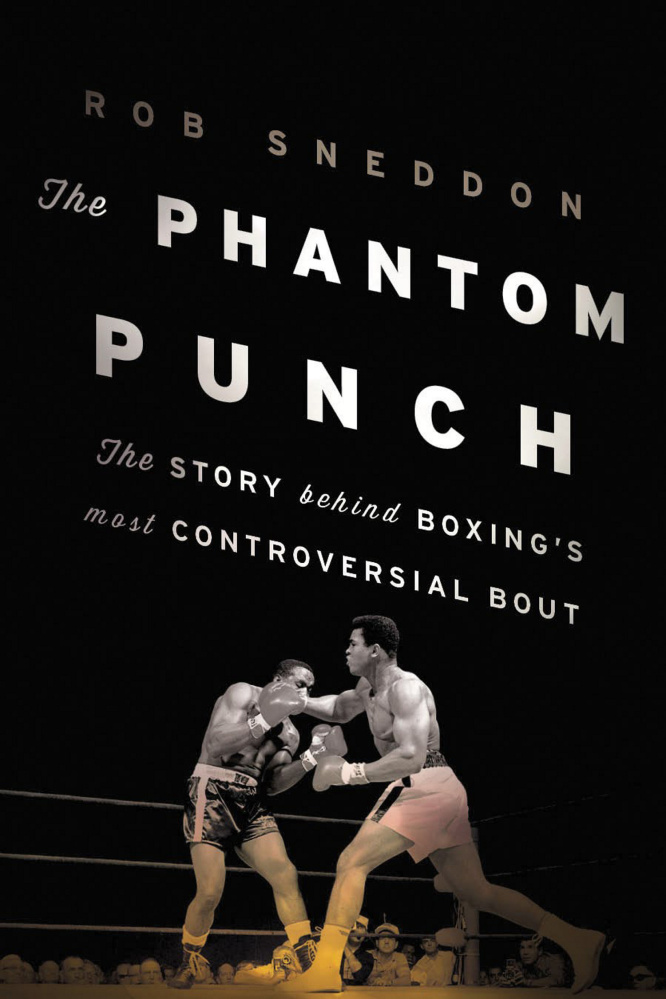The last word on Lewiston’s place in sports infamy belongs to Rob Sneddon, whose curiously timed examination of the Ali-Liston heavyweight title rematch arrived just in time for the 51st anniversary of that stunted fight.
The good news for readers is that the New Hampshire author, unlike the winner of that match, has made a clear connection in “The Phantom Punch: The Story Behind Boxing’s Most Controversial Bout.” Sneddon’s meticulously researched 224-page book serves as a chronicle of a bygone era in sports but also as an homage to a city rich in character, and characters.
Drawing on contemporary accounts – Sneddon cites 26 newspapers among his sources – and interviews with those who were there, the author practically puts the reader in the crowd at the Central Maine Youth Center for that May 25, 1965, fight that changed boxing forever, when a brash upstart who had recently changed his name to Muhammad Ali knocked out the brutish and maligned Sonny Liston in one inflammatory round.
Much has been written about the fight, centering around the debate over whether Ali truly landed a blow with enough force to floor the 215-pound Liston or if the mob-connected former champion had taken a dive. Sneddon addresses that topic head-on. But his book is as much interested in the location of the fight and how it came to be held in Lewiston of all places, as it is with what transpired inside the ring.
Sneddon traces the history of boxing’s hold on the working-class city, introducing readers to the visionary impresario Sam Michael, who becomes the real protagonist of the story. The book’s dedication even reads, “For Sam Michael, who believed in Lewiston more than Lewiston did.”
It was Michael’s audacity, combined with shifting social and political forces, and a bit of luck, that made Lewiston the last, best hope for staging a fight that was in jeopardy of being scuttled for lack of a willing host. Sneddon shifts between fast-moving events in Boston and Lewiston – and America as a whole – with a growing urgency, revealing a reporter’s eye for detail as he lays out what was happening behind the scenes and for public display.
Finally, the people of Lewiston wake up to the news that their city is going to welcome an unprecedented spectacle, with jaundiced reporters about to descend and paint an unflattering portrait of their city for the world.
“The buzz, much of it spoken in French, swirled about Lewiston’s cafes and lunch counters as noon approached,” Sneddon writes of that day. “Over their 25-cent creton sandwiches – cold pork pate – the locals chewed on the outlandish rumor.”
The fight itself is recounted in 16 pages, starting with singer Robert Goulet’s comical botching of the national anthem and ending with referee Jersey Joe Walcott bumbling through the knockdown sequence before belatedly declaring Ali the winner and leading cynical sports fans to openly talk of a “fix.”
But Sneddon is clearly not one of them, and he makes a convincing argument that Ali’s right-handed counterpunch was both surprising and punishing enough to stop Liston. Whether people saw the punch depended on their vantage point, Sneddon reveals, and there were many who accepted the result at face value.
As for titling the book “Phantom Punch,” the author points out that that description came from Ali himself, as in “a punch that did its damage faster than the naked eye could detect.” It was not, as has become the accepted definition, intended to imply that the punch never occurred.
Less convincing is Sneddon’s attempt to guess at what was going through Liston’s mind as he laid on the canvas looking dumbstruck up at Ali in that famous Neil Leifer photo, speculation that continues for two pages. Suffice to say that no one has ever been able to get inside the head of Liston, one of our most inscrutable athletes, destined to die young without ever attempting to explain himself.
But that’s a rare misstep by Sneddon, along with publishing such a fine book months after the Ali-Liston fight received a fresh wave of publicity on its 50th anniversary. There is much here for Mainers, and boxing fans generally, to chew on for another 50 years.
Send questions/comments to the editors.




Success. Please wait for the page to reload. If the page does not reload within 5 seconds, please refresh the page.
Enter your email and password to access comments.
Hi, to comment on stories you must . This profile is in addition to your subscription and website login.
Already have a commenting profile? .
Invalid username/password.
Please check your email to confirm and complete your registration.
Only subscribers are eligible to post comments. Please subscribe or login first for digital access. Here’s why.
Use the form below to reset your password. When you've submitted your account email, we will send an email with a reset code.